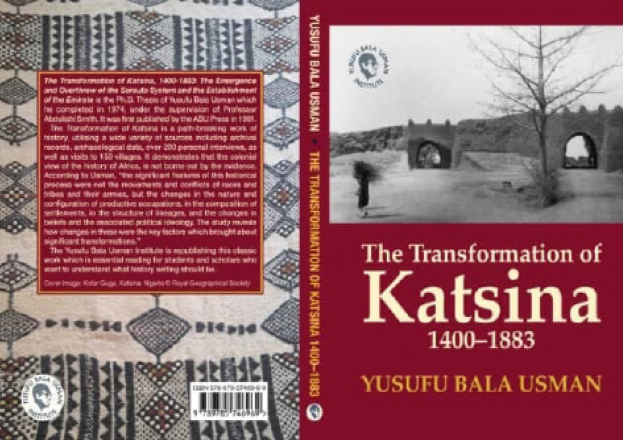Between the 1960s and 1970s, a group of historians at the Ahmadu Bello University (ABU) Zaria, under the tutelage of the late Professor Abdullahi Smith, led a new tradition of historical writing that challenged the then dominant historical writings around state formations in northern Nigeria. It was named the Smithian approach.
Prior to this time, authors of texts on the historical backgrounds of northern states such as Heinrich Barth, H.R Palmer, R.W Hull and M.G Smith interpreted the pre-colonial states, societies and transformation of northern states including Katsina as the movement of tribes and races, lacking the historical agency to initiate social change and progress.
Thus, the Smithians named after its founder aimed to expose the fallacious assumptions of these western authors.
One of the writings that came out of this movement was Bala Usman’s ‘The Transformation of Katsina (TTK), 1400-1883’ published by ABU Press in 1981. The book went beyond the theoretical level of the Smithians works by successfully using it to challenge the dominant racist interpretation of history promoted by the western authors.
Divided into nine chapters, TTK covers five centuries of historical transitions in Katsina State from the 1400 to 1883. Primary and secondary sources used by the author were recovered and collected from over 150 villages, towns and cities, and from over 200 interviews and dozens of manuscripts.
From the first chapter to the last, the reader is presented with a broad survey of the complex historical processes involved in the transformation of Katsina: the emergence of the Sarauta System (1440-1684); the pattern of settlement in the 18th century; the society of Katsina in the 18th century; the overthrow of the Sarauta System; the demise of the Jama’a in Katsina; the establishment of Katsina Emirate; the administration of the emirate; and the changing patterns of settlements and economy in the 19th century.
Two thirds of the publication is devoted to the subject of Sarauta System, its overthrow, and how the Katsina Emirate was established in its wake. The latter, he wrote, took place in four phases: first, the Jihad campaigns in Katsina (1804-1805) when the supporters of Dan Fodio in Katsina were not yet organized; the second (1805-1806) when the jihadists recorded victory against the government with the support of Kano contingents at the battle of Dawakin Girma; the third phase (1806-1807) the period that marked the success of the jihadists in forming a military alliance with Kano, Daura and Katsina contingents and saw successive and organized military offences against Katsina; and finally, the period of (1807-1808) when the Kingdom of Katsina fell to the jihadists, paving way for the establishment Katsina Emirate.
The outcome was Bala Usman’s successful proof that the transformation of Katsina was not the movement of races, tribes and their armies rather the changes in the nature and configuration of the productive occupations, in the composition of settlements, structure of lineages and the changes in beliefs and the associated political ideology.
Since its publication, TTK has been widely recognized by many including prominent Africanist intellectuals such as a doyen Professor E.A Ayandele, “as a trailblazer similar to the Kenneth Dike’s 1956 path breaking work ‘Trade and Politics in the Niger Delta (1830-1885)’. Author, Nigerian Perspectives Thomas Hodgkin, acknowledged that the book helped correct his errors about the history of Katsina; whilst Ugandan academic and author of Citizen and Subject, Professor Mahmood Mamdani described the work as “an intellectual antidote to colonial historiography”.
Regardless of these praises, TTK has its shortfalls, noted by the author himself, who admits there were several rich resources in Nigerian and Nigerien Katsina he didn’t interrogate. There is also the fact that a large number of his oral sources were praise (Kirari) songs of towns, peoples and spirits (Iskoki), and clans of genealogy specialists (Banbadawa) which were all unstructured, and susceptible to factors that shape human memory.
That aside, this foundational text has restored the historical agency and dignity of Katsinawa and brought its rich history and cultures to the attention of the international scholarly community.
The decision to republish the work in 2024, is not just to mark the 19th memorial of Bala Usman’s death (September 24, 2005) but also the purchase of the book’s copyright from its initial publishers by the Yusufu Bala Usman Institute (YBUI).
Written in clear, accessible language and authorial style, TTK is an essential reading for all.





